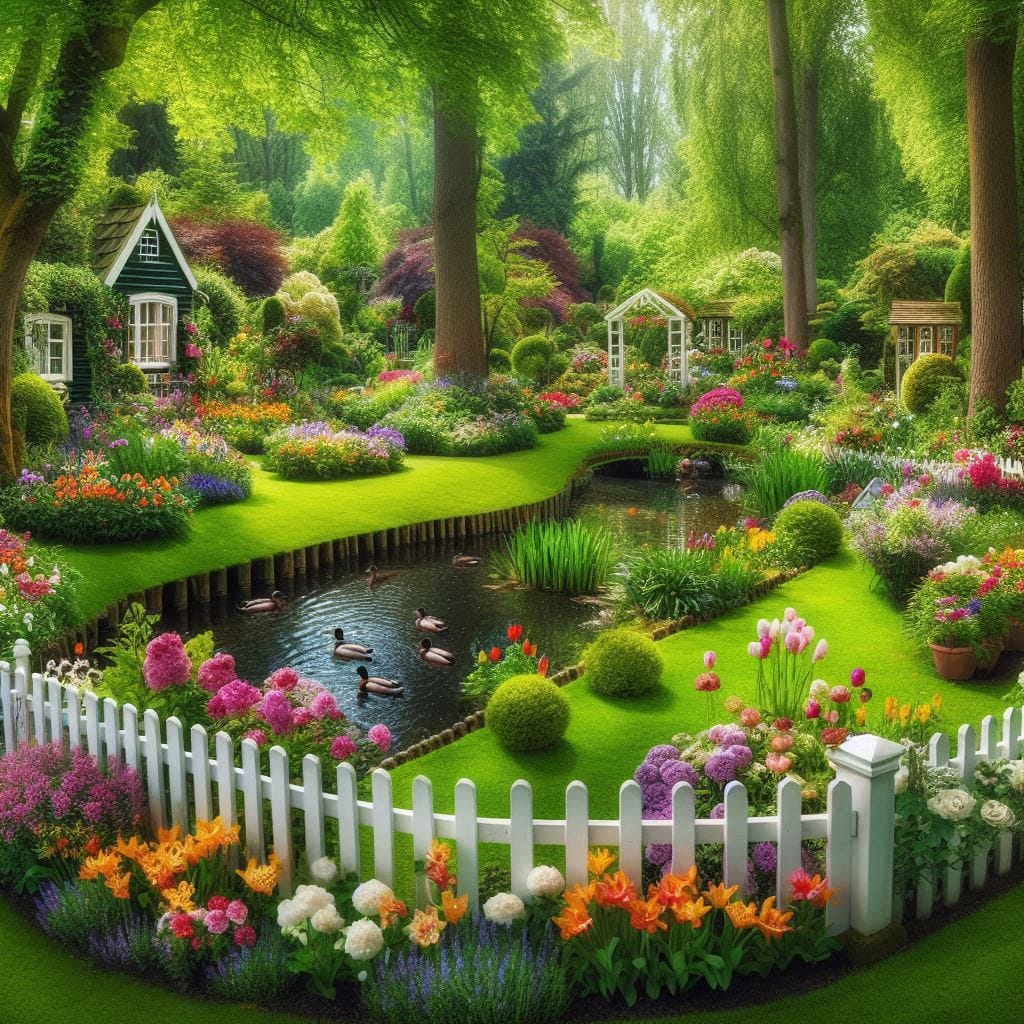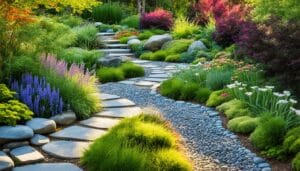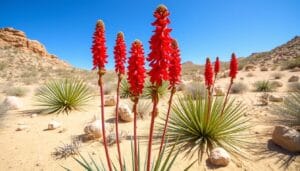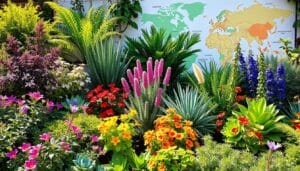Table of Contents
Ready to start your gardening journey but not sure where to begin? This guide is perfect for both newbies and seasoned gardeners. We’ll cover everything from picking the right garden spot to keeping your outdoor space lush and green.
Gardening brings many benefits, like growing your own food and enjoying nature. In this article, you’ll learn the fun of beginner gardening. You’ll also get practical gardening basics and easy gardening ideas. These will turn your outdoor area into a stunning starter garden that will impress your neighbors. So, let’s get started and make you the novice gardener you’ve always dreamed of being.

Key Takeaways
- Discover the benefits of beginner gardening and why it’s a rewarding hobby
- Learn how to choose the perfect garden space for your starter garden
- Explore essential gardening tools and how to set up a beginner’s garden
- Understand the importance of soil preparation and soil types for a thriving garden
- Gain tips on watering techniques and pest control to maintain your new garden
Introduction to Beginner Gardening
Are you new to gardening or a first-time gardener? Gardening is a rewarding hobby that offers many benefits. It’s perfect for beginners who want to start with gardening basics for newbies. This guide will help you begin your gardening journey.
Why Start a Garden?
Starting a garden has many advantages for beginners. It lets you connect with nature and grow your own food. Gardening is also great for your mental and physical health.
Benefits of Gardening for Novices
- Develop a new hobby and learn valuable life skills
- Enhance the aesthetic appeal and functionality of your outdoor living spaces
- Enjoy the satisfaction of growing your own fruits, vegetables, or flowers
- Improve your overall health and well-being through physical activity and stress relief
“Gardening is a great way to connect with nature, learn new skills, and enjoy the fruits of your labor. It’s an incredibly rewarding hobby for gardening for beginners.” – Jane Doe, Master Gardener
Whether you’re a first-time gardener or new to gardening, the journey is exciting. With the right guidance and patience, you can turn your outdoor space into a thriving oasis. It will nourish your body and mind.
Choosing the Right Garden Space
Starting your gardening journey means picking the perfect spot. You might have a big backyard or a small urban patio. There are many options for the right garden space.
If you have little outdoor space, container and raised bed gardening are great. Container gardening lets you grow plants in pots or old items. It’s perfect for small balconies or decks. Raised bed gardening builds beds on the ground. It’s good for bad soil or little space.
With more outdoor space, think about sunlight and how easy it is to get to. Most plants need at least 6 hours of sunlight a day. Also, make sure your garden is easy to water, weed, and maintain.
| Garden Type | Suitable Spaces | Advantages |
|---|---|---|
| Container Gardening | Small balconies, patios, decks | Adaptable to limited space, portable, easy to control soil quality |
| Raised Bed Gardening | Yards, rooftops, small gardens | Improved soil quality, better drainage, easier to maintain |
| Traditional In-Ground Gardening | Spacious yards, gardens | Larger growing area, ability to plant a wider variety of crops |
Choosing your garden type, remember sunlight, access, and space. This ensures your garden space thrives. With good planning, you can make a beautiful and productive garden design that fits your needs.
Gardening for Beginners
Essential Gardening Tools
Starting a garden can seem daunting, but with the right tools, even beginners can enjoy growing their own plants. You’ll need basic hand tools and some specialized equipment. Having the right tools is key for any beginner’s gardening journey.
Beginners should have a sturdy trowel, pruning shears, a gardening fork, and a watering can or hose. These tools help you dig, plant, prune, and water your garden. A garden hoe is great for controlling weeds, and a rake keeps your garden tidy.
Setting Up a Beginner’s Garden
With the tools in hand, it’s time to plan and set up your garden. Choose a spot that gets enough sunlight and has good drainage. If space is tight, consider a raised bed or containers. These options are easier for beginners.
Make sure your garden has a plan for drainage and soil prep. You might need to add compost or aged manure to the soil. With the right tools and a good plan, your beginner’s garden will thrive.
| Essential Gardening Tools | Description |
|---|---|
| Trowel | A small hand tool used for digging, planting, and transplanting |
| Pruning Shears | Sharp blades for trimming and shaping plants and shrubs |
| Garden Fork | A tool with tines used for loosening and aerating soil |
| Watering Can or Hose | For providing water to your plants as needed |
| Garden Hoe | A tool for removing weeds and loosening soil |
| Rake | Used for leveling soil, removing debris, and maintaining a tidy garden |
Preparing the Soil
Preparing the soil is key to a thriving garden. Knowing about garden soil types and how to improve it is crucial. It greatly affects your plants’ success.
Understanding Soil Types
Soil types vary a lot. Some are sandy and drain fast, while others are heavy and clay-based. Knowing your soil type helps you choose the right way to improve it.
- Sandy soil: This soil is light and drains quickly. It’s hard for plants to hold onto moisture and nutrients.
- Clay soil: Clay soil is dense and can compact. This makes it hard for plant roots to grow well.
- Loamy soil: Loamy soil is the best. It’s a mix of sand, silt, and clay. It drains well and is rich in nutrients.
Amending and Enriching Soil
After figuring out your soil type, it’s time to add soil amendments and organic matter. This can include:
- Compost: Adding compost makes your soil better in structure and fertility.
- Manure: Well-aged manure gives plants a balanced mix of nutrients.
- Peat moss: Peat moss helps keep moisture in and improves drainage in sandy or clay soils.
By understanding and preparing your garden soil, you’re setting up your garden for success. This is the start of a great organic gardening journey.

Selecting Plants for Your Starter Garden
Choosing the right plants for your beginner garden is key to a thriving space. Whether you’re into vegetable gardening, flower gardening, or herb gardening, knowing about plant selection and garden design is crucial.
Think about your local climate, sunlight, and what you like when picking plants. This ensures you pick the right plants for your garden. It also makes gardening a success.
Vegetables and Fruits for Beginners
- Tomatoes: Easy to grow and provide a bountiful harvest.
- Leafy greens: Such as lettuce, spinach, and kale, are low-maintenance and thrive in most climates.
- Zucchini and squash: Prolific producers that require minimal care.
- Herbs: Basil, parsley, and chives are versatile and add flavor to your cooking.
Flowering Plants for Beginner Gardeners
- Marigolds: Vibrant flowers that repel pests and thrive in full sun.
- Sunflowers: Cheerful and easy-to-grow, adding a touch of sunshine to your garden.
- Petunias: Cascading flowers that come in a variety of colors and grow well in containers.
| Plant Type | Sunlight Requirement | Watering Needs | Maintenance Level |
|---|---|---|---|
| Tomatoes | Full sun | Moderate | Moderate |
| Leafy Greens | Partial shade | Moderate | Low |
| Marigolds | Full sun | Low | Low |
Start small and grow your garden gradually. Choose plants that do well in your conditions. This will help you have a successful and rewarding gardening journey.
“The greatest gift of the garden is the restoration of the five senses.” – Hanna Rion
Watering and Maintenance Tips
Keeping a garden healthy needs careful watering and pest control. As a new gardener, knowing how to water and spot pests is crucial. It greatly affects your plants’ health and growth.
Proper Watering Techniques
Having a regular watering schedule is key. Water deeply to let the soil soak up the water well. This helps roots grow strong, fighting off drought and disease better.
Watch for signs of too much or too little water. Look for wilting leaves, color changes, or water pooling. Adjust your watering to keep your plants just right.
Identifying and Dealing with Pests
Pests can be a big problem for new gardeners. Look for signs of insects, fungi, or other issues harming your plants. Organic gardening methods like natural repellents or beneficial insects are good and safe.
Quickly tackle garden pests and use organic pest control. This keeps your garden healthy and reduces chemical use.

Remember, regular garden maintenance and being proactive with watering and pest control are vital. Follow these tips for a lush and fruitful garden.
Organic Gardening Basics
Many gardeners choose organic gardening for its eco-friendly and sustainable nature. This approach uses natural materials and practices to grow a garden without chemicals. By going for organic gardening, you can grow beautiful plants and help the environment.
Benefits of Organic Gardening
Switching to organic gardening brings many benefits for your garden and you. Here are some key advantages:
- Promotes sustainable gardening practices that are kind to the environment
- Uses natural pest control methods, cutting down on harmful chemicals
- Improves soil health by adding organic matter and avoiding synthetic fertilizers
- Grows eco-friendly and nutritious fruits, veggies, and flowers
- Supports a diverse ecosystem that helps pollinators and other beneficial organisms
By following organic gardening principles, you can make a garden that’s healthy for your plants and the planet.
Garden Design Ideas for Beginners
Starting a garden can seem scary if you’re new to it. But, with some creativity, you can turn any small space into a beautiful garden. Here are some ideas for beginners to get started.
Container gardening is a great choice for beginners. Use colorful pots and planters to create a garden on your patio or balcony. Mix herbs, flowers, and small veggies for a stunning look.
If you have more space, try raised bed gardening. Raised beds let you control the soil, making it easier to grow many plants. Try different shapes and sizes to make your garden interesting.
Don’t worry if you have a small urban space. Use small-space gardening tricks like vertical gardening. Add a living wall or hanging planters to make your space feel bigger.
Remember, gardening is all about having fun and trying new things. Add your own style with garden art, seating, or a cozy spot. With creativity and enthusiasm, your garden will become a special place for you and wildlife.
Conclusion
Starting your gardening for beginners journey is exciting. We hope this guide has given you the basics and inspiration for your starter garden. You now know how to turn your outdoor space into a lush oasis.
The joys of new to gardening are many. You’ll enjoy growing your own food and the peace of being outdoors. Whether you’re new or just starting, gardening offers growth and learning.
Keep exploring and trying new easy gardening ideas. There’s always more to learn. Use blogs, forums, and local groups to grow your skills. So, start gardening and watch your starter garden grow!
FAQ
What are the benefits of starting a garden for beginners?
Starting a garden can be very rewarding. It lets you connect with nature and grow your own food. It also boosts your mental and physical health. Plus, it’s a great way to start a new hobby and beautify your outdoor space.
How do I choose the right garden space for my needs?
When picking a garden spot, think about sunlight, size, and how easy it is to get to. If you have little space, consider using containers or raised beds. These can be great for small areas like patios or balconies.
What essential gardening tools do I need to get started?
Beginners need basic tools like hand trowels, garden hoes, and pruning shears. You’ll also need watering tools and gloves. The right tools make gardening easier and more enjoyable.
How do I prepare the soil for my beginner’s garden?
It’s important to know your soil type and add organic matter like compost. Testing your soil’s pH is key to creating a healthy environment for your plants. This ensures they grow well.
What plants are best for a beginner’s garden?
Beginners should pick easy-to-grow plants that fit their climate and preferences. Think about how much sunlight they need and how far apart to plant them. This helps your garden thrive.
How do I properly water and maintain my beginner’s garden?
Watering is crucial. Find a routine that keeps your plants moist but not too wet. Watch for signs of too much or too little water. Also, use natural ways to fight pests and diseases.
What are the benefits of organic gardening for beginners?
Organic gardening is good for the planet and your health. It uses natural methods to feed and protect plants. This way, you get fresh, chemical-free food and help the environment.
How can I design a visually appealing garden as a beginner?
Try different layouts like raised beds or containers. Add paths, seating, and decorations to make your garden beautiful. This makes your outdoor space inviting and enjoyable.





